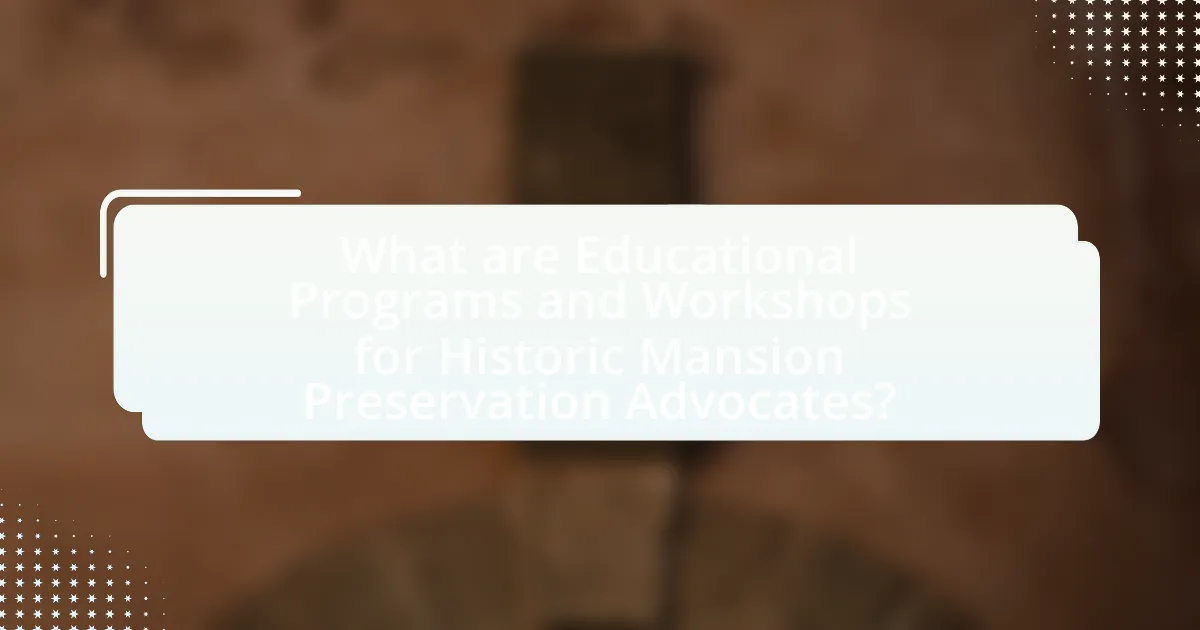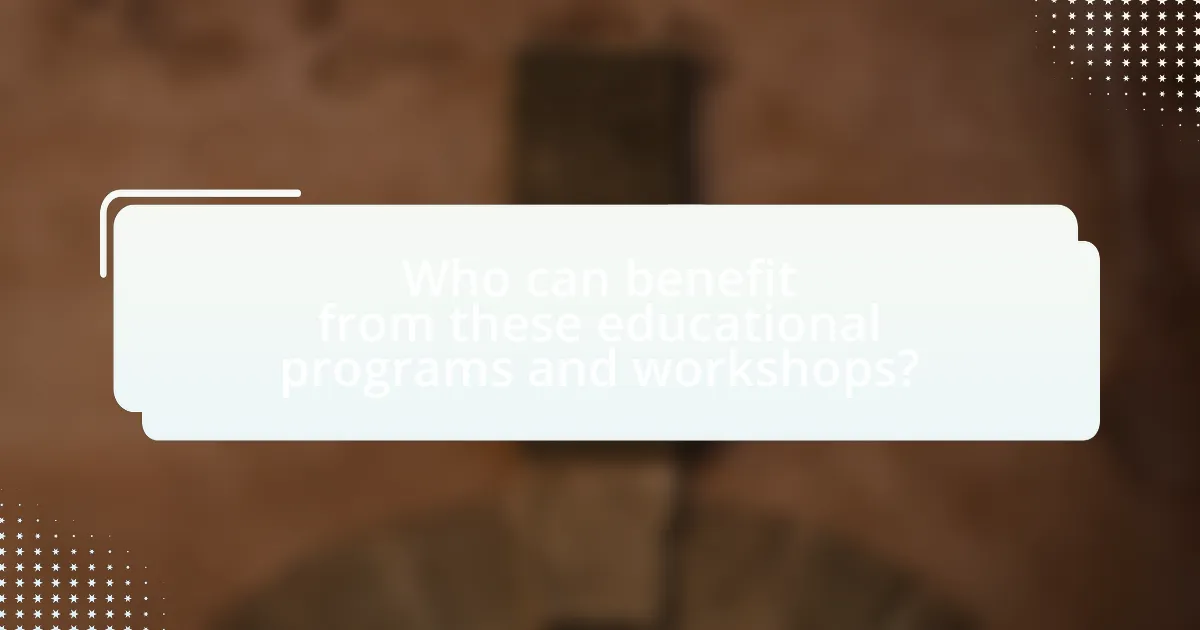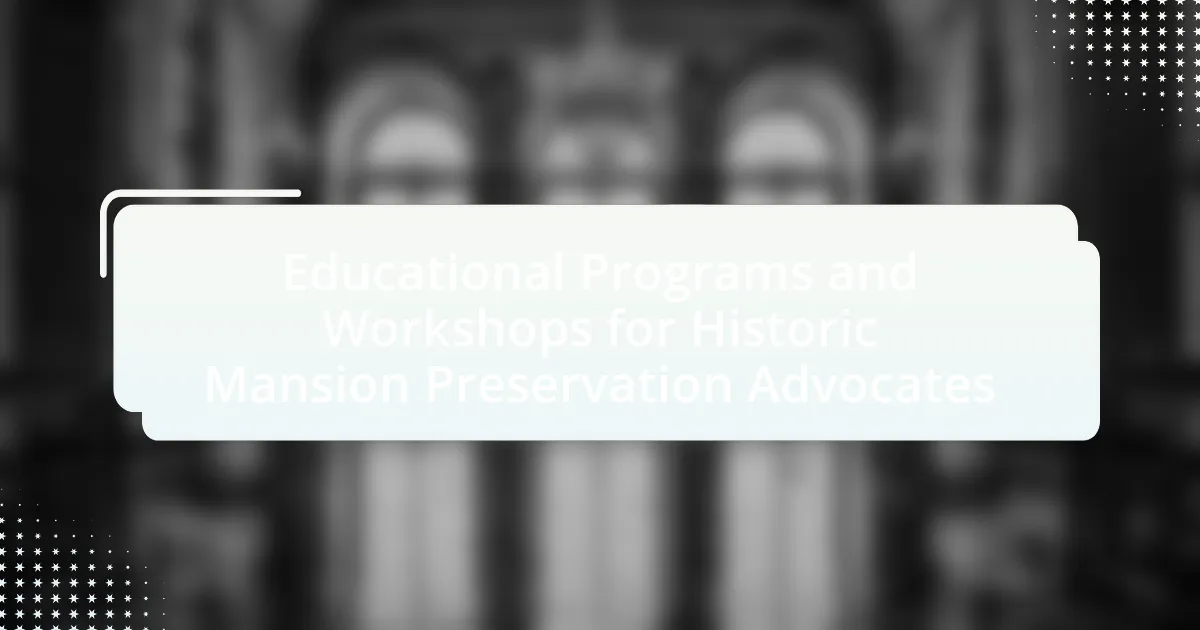Educational programs and workshops for historic mansion preservation advocates are structured learning experiences aimed at equipping individuals with essential knowledge and skills for effective preservation. These programs cover a range of topics, including architectural history, restoration techniques, legal frameworks, and fundraising strategies, fostering a community of informed advocates. Participants gain practical skills through hands-on training and collaborative learning, which enhance their ability to navigate challenges in preservation efforts. The article highlights the importance of these educational initiatives in supporting advocacy, addressing common challenges, and maximizing the effectiveness of preservation projects.

What are Educational Programs and Workshops for Historic Mansion Preservation Advocates?
Educational programs and workshops for historic mansion preservation advocates are structured learning experiences designed to equip individuals with the knowledge and skills necessary for the effective preservation of historic mansions. These programs often cover topics such as architectural history, restoration techniques, fundraising strategies, and legal frameworks related to heritage conservation. For instance, organizations like the National Trust for Historic Preservation offer workshops that provide hands-on training and expert-led discussions, enabling advocates to learn best practices in preservation. Such educational initiatives are crucial for fostering a community of informed advocates who can successfully navigate the complexities of preserving historic properties.
How do these programs support preservation efforts?
Educational programs and workshops for historic mansion preservation advocates support preservation efforts by providing essential knowledge and skills necessary for effective conservation practices. These programs equip participants with techniques in restoration, maintenance, and advocacy, ensuring that historic properties are preserved for future generations. For instance, workshops often include hands-on training in materials conservation and historical research methodologies, which are critical for informed decision-making in preservation projects. Additionally, these programs foster a community of advocates who share best practices and collaborate on preservation initiatives, amplifying their impact.
What types of skills are taught in these programs?
Educational programs and workshops for historic mansion preservation advocates teach skills such as architectural restoration techniques, historical research methodologies, and preservation project management. These skills enable participants to effectively assess, document, and restore historic properties while adhering to preservation standards. For instance, training often includes hands-on experience with materials and tools specific to restoration, as well as understanding legal frameworks and funding sources relevant to preservation efforts.
How do these skills apply to real-world preservation projects?
Skills acquired through educational programs and workshops for historic mansion preservation advocates directly enhance the effectiveness of real-world preservation projects by equipping participants with practical knowledge and techniques. For instance, skills in architectural analysis enable advocates to assess the structural integrity of historic buildings, ensuring that restoration efforts maintain historical accuracy while adhering to safety standards. Additionally, knowledge of preservation laws and funding sources allows advocates to navigate regulatory frameworks and secure necessary financial support, which is crucial for the success of preservation initiatives. Evidence of this impact can be seen in successful projects, such as the restoration of the Frank Lloyd Wright-designed Robie House, where trained advocates effectively utilized their skills to secure funding and implement preservation best practices, resulting in a project that honors both the building’s historical significance and its structural needs.
Why are these educational initiatives important for advocates?
Educational initiatives are important for advocates because they equip them with essential knowledge and skills necessary for effective historic mansion preservation. These programs provide insights into preservation techniques, legal frameworks, and funding opportunities, enabling advocates to navigate challenges in their efforts. For instance, workshops often include case studies and expert-led discussions that highlight successful preservation strategies, which can be directly applied to local initiatives. Furthermore, educational initiatives foster a sense of community among advocates, facilitating networking and collaboration that can enhance preservation efforts.
What role do advocates play in historic preservation?
Advocates play a crucial role in historic preservation by raising awareness, mobilizing community support, and influencing policy decisions. They educate the public about the significance of preserving historical sites, often organizing campaigns and events to highlight the cultural and historical value of these properties. For instance, organizations like the National Trust for Historic Preservation actively engage in advocacy efforts, providing resources and training to empower local advocates. This involvement not only helps protect endangered sites but also fosters a sense of community identity and pride, as evidenced by numerous successful preservation initiatives across the United States.
How can education enhance advocacy effectiveness?
Education enhances advocacy effectiveness by equipping advocates with the knowledge and skills necessary to articulate their message clearly and persuasively. Through educational programs and workshops, advocates learn about historical preservation techniques, legal frameworks, and community engagement strategies, which are essential for effective advocacy. For instance, a study by the National Trust for Historic Preservation found that trained advocates are 50% more likely to successfully mobilize community support for preservation initiatives. This training not only increases their confidence but also improves their ability to navigate complex regulatory environments, ultimately leading to more successful advocacy outcomes.

What topics are typically covered in these educational programs?
Educational programs and workshops for historic mansion preservation advocates typically cover topics such as architectural history, preservation techniques, legal frameworks for heritage conservation, fundraising strategies, and community engagement. These subjects are essential for equipping advocates with the knowledge and skills necessary to effectively preserve and promote historic properties. For instance, understanding architectural history allows advocates to appreciate the significance of various styles and periods, while knowledge of preservation techniques ensures that restoration efforts are both effective and respectful of the original design. Legal frameworks provide insight into the regulations governing preservation efforts, and fundraising strategies are crucial for securing financial support. Community engagement fosters collaboration and support for preservation initiatives, making these topics vital for successful advocacy in historic mansion preservation.
How do workshops address specific preservation challenges?
Workshops address specific preservation challenges by providing targeted training and resources to preservation advocates. These educational programs equip participants with practical skills, such as restoration techniques and conservation methods, tailored to the unique needs of historic mansions. For instance, workshops often include hands-on activities that demonstrate best practices in materials conservation, which directly respond to the challenges of maintaining the structural integrity and historical authenticity of these properties. Additionally, expert-led discussions during workshops facilitate the sharing of case studies and successful strategies, reinforcing the effectiveness of collaborative learning in overcoming preservation obstacles.
What are common challenges faced by historic mansion advocates?
Historic mansion advocates commonly face challenges such as funding shortages, regulatory hurdles, and public awareness issues. Funding shortages often arise due to limited financial resources for restoration and maintenance, making it difficult to preserve these properties. Regulatory hurdles include navigating complex zoning laws and preservation guidelines that can impede renovation efforts. Additionally, public awareness issues stem from a lack of community engagement and understanding of the historical significance of these mansions, which can lead to insufficient support for preservation initiatives.
How do workshops provide solutions to these challenges?
Workshops provide solutions to challenges in historic mansion preservation by offering targeted training and resources that enhance participants’ skills and knowledge. These educational programs facilitate hands-on learning experiences, allowing advocates to engage with preservation techniques, legal frameworks, and funding opportunities. For instance, workshops often include expert-led sessions that cover best practices in restoration and maintenance, which directly address common issues faced by preservationists. Additionally, collaborative activities during workshops foster networking among advocates, enabling them to share strategies and solutions that have proven effective in similar contexts. This combination of practical training and community support equips participants with the tools necessary to overcome obstacles in their preservation efforts.
What methodologies are used in teaching these programs?
The methodologies used in teaching educational programs and workshops for historic mansion preservation advocates include experiential learning, case studies, and collaborative projects. Experiential learning allows participants to engage directly with preservation techniques through hands-on activities, enhancing their practical skills. Case studies provide real-world examples of successful preservation efforts, enabling learners to analyze and apply best practices. Collaborative projects foster teamwork and problem-solving, encouraging advocates to work together on preservation challenges, which is essential for community engagement and advocacy. These methodologies are effective in equipping participants with the knowledge and skills necessary for successful historic preservation.
How do hands-on experiences benefit participants?
Hands-on experiences benefit participants by enhancing their practical skills and deepening their understanding of preservation techniques. Engaging directly with materials and processes allows participants to apply theoretical knowledge in real-world contexts, which fosters retention and mastery of skills. Research indicates that experiential learning can increase knowledge retention by up to 75% compared to traditional lecture-based learning methods. This active involvement not only boosts confidence but also encourages collaboration and problem-solving among participants, essential skills in the field of historic mansion preservation.
What role does collaboration play in these educational settings?
Collaboration plays a crucial role in educational settings focused on historic mansion preservation by fostering knowledge sharing and resource pooling among advocates. This cooperative approach enhances the effectiveness of preservation efforts, as participants can leverage diverse expertise and experiences to address complex challenges. For instance, collaborative workshops often bring together architects, historians, and community members, allowing for a comprehensive understanding of preservation techniques and historical significance. Studies have shown that collaborative learning environments improve problem-solving skills and increase engagement, which is vital for the success of preservation initiatives.

Who can benefit from these educational programs and workshops?
Individuals involved in historic mansion preservation, including advocates, volunteers, and professionals in the field, can benefit from these educational programs and workshops. These programs provide essential knowledge and skills related to preservation techniques, historical research, and advocacy strategies, which are crucial for effective preservation efforts. For instance, participants can learn about best practices in restoration, legal frameworks governing historic sites, and community engagement methods, all of which enhance their ability to protect and promote historic mansions.
What types of individuals are typically involved in historic mansion preservation?
Individuals typically involved in historic mansion preservation include architects, historians, preservationists, and community advocates. Architects contribute their expertise in design and restoration techniques, ensuring that renovations maintain historical integrity. Historians provide context and research, helping to document the mansion’s significance and guiding preservation efforts. Preservationists focus on the conservation of materials and structures, often working with local and national preservation organizations. Community advocates engage the public, raising awareness and support for preservation initiatives. These roles are essential for successful preservation projects, as they combine technical skills, historical knowledge, and community involvement to protect and maintain historic mansions.
How do professionals differ from volunteers in their educational needs?
Professionals differ from volunteers in their educational needs primarily due to their varying levels of expertise and specific job requirements. Professionals often require advanced training and specialized knowledge to meet industry standards and perform their roles effectively, such as understanding preservation techniques, legal regulations, and project management. In contrast, volunteers typically seek foundational knowledge and general skills that enhance their ability to contribute without the same level of commitment or expertise.
For instance, a study by the National Trust for Historic Preservation indicates that professionals benefit from targeted workshops that delve into advanced preservation methods, while volunteers often engage in introductory courses that cover basic historical context and hands-on skills. This distinction highlights the necessity for tailored educational programs that address the specific needs of each group within the context of historic mansion preservation.
What unique perspectives do community members bring to these programs?
Community members bring diverse cultural, historical, and experiential perspectives to educational programs and workshops for historic mansion preservation advocates. Their unique insights stem from personal connections to the local history, which can inform preservation strategies and highlight the significance of specific architectural features. For instance, community members often share oral histories and traditions that may not be documented, enriching the understanding of the mansion’s role in the community. Additionally, their involvement can foster a sense of ownership and responsibility towards preservation efforts, as evidenced by studies showing that local engagement increases the likelihood of successful preservation initiatives.
How can participants maximize their learning experience?
Participants can maximize their learning experience by actively engaging with the content and collaborating with peers. Engaging in discussions, asking questions, and sharing insights during educational programs and workshops enhances understanding and retention of information. Research indicates that active participation can improve learning outcomes by up to 50%, as it fosters critical thinking and deeper comprehension. Additionally, networking with fellow advocates allows for the exchange of diverse perspectives and best practices, further enriching the learning process.
What strategies can advocates use to apply their learning effectively?
Advocates can apply their learning effectively by implementing practical strategies such as developing action plans, engaging in community outreach, and utilizing collaborative networks. Action plans allow advocates to translate knowledge into specific, measurable goals, ensuring that learning is applied in a structured manner. Community outreach fosters awareness and support for preservation efforts, enabling advocates to share their knowledge and engage stakeholders. Collaborative networks, including partnerships with local organizations and experts, enhance resource sharing and provide diverse perspectives, which can lead to more effective advocacy outcomes. These strategies are supported by research indicating that structured approaches and community involvement significantly improve the effectiveness of advocacy efforts in preservation contexts.
How can networking enhance the educational experience for participants?
Networking enhances the educational experience for participants by facilitating the exchange of knowledge, resources, and opportunities among individuals in the field of historic mansion preservation. Through networking, participants can connect with experts, share best practices, and gain insights that are not typically available through formal education alone. For instance, studies show that collaborative learning environments, fostered by networking, lead to improved problem-solving skills and innovation in preservation techniques. Additionally, networking can provide access to mentorship opportunities, which are crucial for professional development in specialized fields like historic preservation.

Leave a Reply